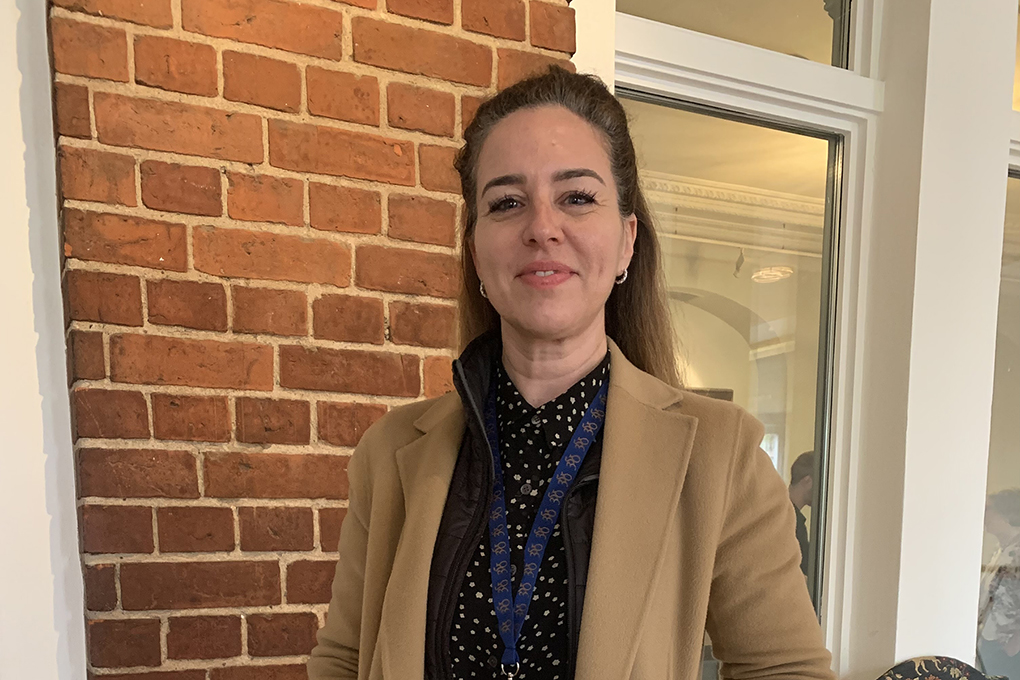
Vanessa Jonsson
Assistant Professor in the Applied Mathematics Department, University of California, USA
Invited speaker and participant in the workshop
Contact: Vjonsson@ucsc.edu
Read more about Vanessa Jonsson and her research: https://jonssonlab.com/
Vanessa Jonsson aims to understand how the immune system evolves in the context of human disease, among other things, cancer. She and her research group develop mathematical models and build computational methods to analyze high throughput genomic and immunological data. The goal is to understand the dynamic interactions between host immunity, human disease, and therapy.
What are your thoughts on the workshop?
– It has been wonderful! I am so lucky to be here. It was a wonderful experience. It is a unique environment, with few people and an extensive exchange of ideas.
What value did the workshop add to your research?
– It got me thinking again about mathematical modeling. I did my PhD in automatic control but then came into the field of immunology. The workshop brought me back into automatic control and the methods used for the type of data I am looking at. It made me reconnect with people at automatic control and make new connections with people doing similar things to me.
What will you bring with you home?
– I bring the connections and all the wonderful people working at the interface with me. I also bring many new ideas and possibilities for future collaborations in Europe. I typically work on a local scale and with other researchers in the US. I sometimes feel that I lack an international perspective – but I got that here.
Contact:
Vjonsson@ucsc.edu
Read more about Vanessa Jonsson and her research:
https://jonssonlab.com/
Sara Ek
Professor at the Department of Immunotechnology, Lund University, Sweden: Invited speaker and participant in the workshop
Contact: sara.ek@immun.lth.se
Read more about Sara Ek and her research:
https://www.immun.lth.se/research/principal-investigators/sara-ek/
https://portal.research.lu.se/en/persons/sara-ek#Overview
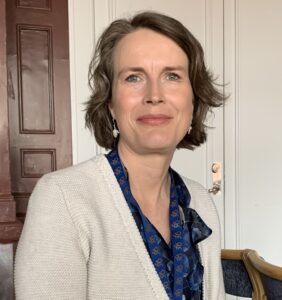
The main challenge to successfully treating cancer is the heterogeneity of the malignancy. Sara Ek’s research focuses on methods that capture that heterogeneity and provide information on variations in tumor-related signaling pathways and their interaction with the surrounding immune microenvironment. Translational bioinformatics bridges the gap between data and clinical practice.
What was the highlight of the workshop?
– I got an improved understanding of the state-of-the-art of current research models of the immune system. All researchers here have the same interest, but we use different methods. This workshop improved my knowledge and gave me ideas for future cooperation with mathematical modelers. I also got practical advice on accessing data from those who work on large-scale projects.
What was the most interesting question that you got?
– Someone asked me what I would do if I were not limited by what data was available and if I had all the samples I wished for. I thought it was a great question because it is so easy that we limit ourselves to what is before us. Instead of asking the question one would really like the answer to and thinking about how to access the material needed to answer that question. What is the ideal case, and how can I get there?
What will you bring with you from this workshop?
– I enjoyed the format of the workshop. We are few participants, it is intense, and the discussions are open. It was great!
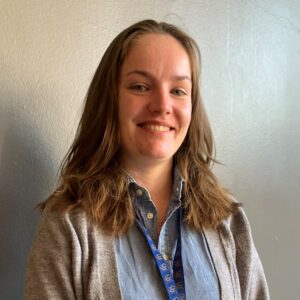
Solveig van der Vegt
PhD student at the Wolfson Centre for Mathematical Biology, Mathematical Institute, University of Oxford, UK
Participant in the first part of the focus period and the workshop
Contact: solveig.vandervegt@st-hildas.ox.ac.uk
Read more about Solveig van der Vegt and her research:
https://www.linkedin.com/in/solveig-van-der-vegt-6b936877
Solveig van der Vegt’s research interest is in mathematical immunology. Her PhD studies focus on mathematical modeling of autoimmune myocarditis and the effect of immune checkpoint inhibitors on the development and progression of the disease. She cooperates with experimental as well as computational scientists.
What was the highlight of the focus period?
– During my PhD I have read a lot of interesting and intriguing papers. At this workshop, I met some of the senior researchers behind these papers and discussed with them. That was amazing! They seemed so interested in what we young researchers are doing.
Did the visit give you access to infrastructure that you would otherwise not have had access to?
– Yes. I am new to data science and machine learning, and I was not familiar with workflows. It was pretty overwhelming to me. But people took the time to explain everything to me, and I learned a lot. I am very happy about that.
What will you bring with you from the focus period?
– I am really grateful I got the opportunity to participate. I had a great time and met very nice people. I made a pretty decent network, and even if I were to leave academia, I would continue following these people and their research.
Michelle Böck
Postdoc at the Dana-Farber Cancer Institute and Harvard Medical School, USA
Participant in the first part of the focus period and the workshop
Contact:
michelle.boeck@gmail.com
Read more about Michelle Böck and her research:
https://people.kth.se/~miboeck/
https://www.linkedin.com/in/michelle-boeck/
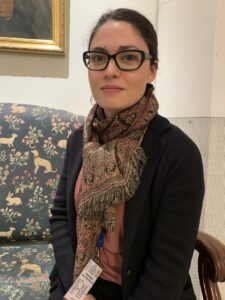
Michelle Böck’s research focuses on the mathematical optimization of methods for treating cancer with radiation. The goal is to maximize the radiation of diseased tissue while protecting healthy tissue, thus improving radiation therapy treatment planning methods and increasing clinical efficiency and accuracy.
What was the highlight of the focus period?
– All lectures were fascinating. I appreciate that different research disciplines can meet in this way, respecting each other and learning from each other. Everyone made an effort to present their research so that we could all understand.
What value has the visit added to your research?
– I learned a lot about methods other than the ones I am currently using. In particular, the hackathon was valuable to me since I learned about gene expression and how to work with that from those active in wet labs*.
What will you bring with you from the focus period?
– The focus period and the workshop were very well organized. I am so grateful to all the senior researchers who gave their time and resources for us younger researchers to improve our knowledge and develop our skills. I think it was really nice of them.
* A wet lab is one where drugs, chemicals, and other biological matter can be analyzed and tested using various liquids. On the other hand, a dry lab focuses on applied or computational mathematical analyses using computer-generated models or simulations.
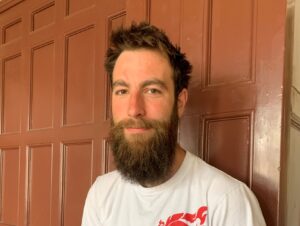
Torkel Loman
PhD student at the Sainsbury Laboratory, University of Cambridge, UK
Participant in the first part of the focus period and the workshop
Contact:
torkel.loman@slcu.cam.ac.uk
Read more about Torkel Loman and his research:
https://www.slcu.cam.ac.uk/people/torkel-loman
Torkel Loman’s research interest is in the interface between mathematics and biology. He is currently designing and analyzing mathematical models of the various stress response pathways in the bacteria Bacillus subtilis. The simple nature of bacteria systems, combined with the relative ease with which we can generate high-quality data, makes B. subtilis an ideal target for studying complex regulatory networks of gene expression in response to stress using mathematical models.
What will you bring with you from this workshop?
– There is an immense amount of data, but it is challenging to extract information from this data. Therefore, we need to combine the data sets and the tools used to analyze them with high-quality biological knowledge to get useful predictions.
What has been most inspiring to you during the workshop?
– I am at a biological department and typically attend biological conferences. Here I have met people with a mathematical and modeling focus. It was very interesting, and I got many more relevant questions than I usually get.
Did the visit here give you access to infrastructure that you would otherwise not have had access to?
– It gave me access to people. There are people from many different fields here, and the organizers utilized that in an excellent way.
Giovanni Visona
PhD student at the Max-Planck Institute for Intelligent Systems, Tübingen, Germany
Participant in the first part of the focus period and the workshop
Contact:
giovanni.visona@tuebingen.mpg.de
Read more about Giovanni Visona and his research:
https://www.gvisona.com/
https://www.linkedin.com/in/giovanni-visona/
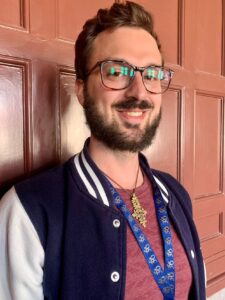
As part of the Machine Learning Frontiers for Precision Medicine framework, Giovanni Visona’s research aims to apply deep learning models to lean rich data representations from datasets such as The Cancer Genome Atlas (TCGA) and Genomics of Drug Sensitivity in Cancer (GDSC). The goal? To gain insight into mutations that affect signaling pathways involved in the development of cancer.
What value has the visit added to your research and you personally?
– I got in contact with people whose expertise is complementary to mine. I started my PhD during the Covid-19 pandemic and have mostly met people online. Being in the same room is so much better; it is much easier to start a dialogue with someone when you are in the same physical space.
What was the highlight of the focus period?
– I was very intrigued by the course we had before the workshop, where I learned new tools that I may integrate into my research.
What will you bring with you from your stay here?
– The visit gave me many networking opportunities. So when I start my next project, I know who to call.
Any other thoughts that you would like to share?
– It has been amazing!
